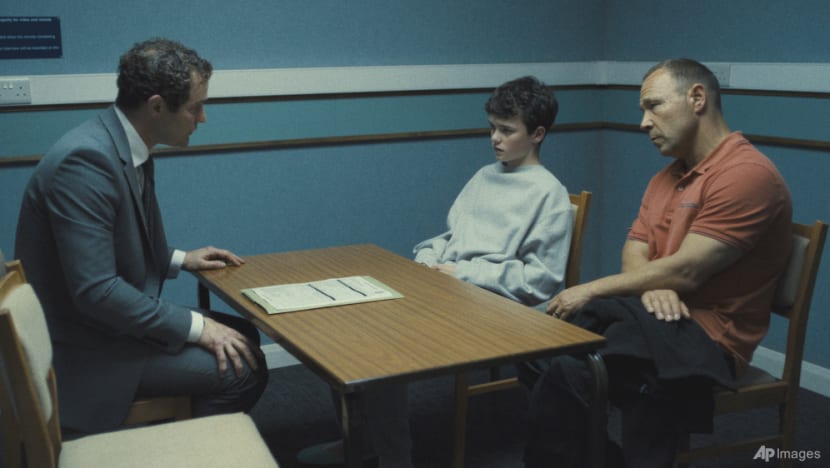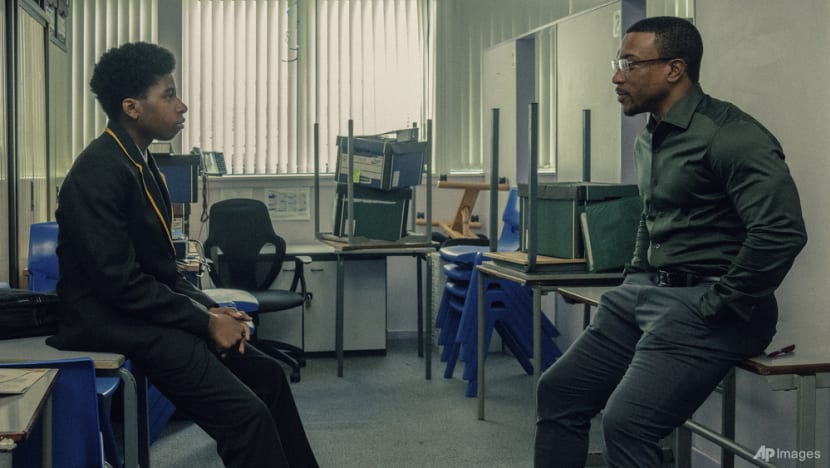Commentary: Netflix's Adolescence captures the guilt fathers often carry
When the loudest voices shaping young men today are from strangers on the internet, raising sons feels like fighting a tidal wave, says writer Kelvin Kao.

This image released by Netflix shows Mark Stanley, from left, Owen Cooper and Stephen Graham in a scene from Adolescence. (Netflix via AP)

This audio is generated by an AI tool.
SINGAPORE: “Who’s that, Finn?” I asked after glancing at my 13-year-old son’s phone. He shrugged and swiped up.
“No idea, just some random YouTuber,” he said, moving on to the next video which happened to be a Coin Master ad.
I never got a proper look, but something about the man on screen – the sunglasses, the tone, the posture – made me think it might’ve been Andrew Tate. Or someone parodying him, which I secretly hoped. I couldn’t be sure, and somehow, that uncertainty felt just as unsettling.
It reminded me of the much-discussed Netflix show Adolescence, a drama exploring the aftermath of a shocking act of violence by a 13-year-old boy.
While the story centres on Jamie’s alleged crime, it’s also about boys coming of age in a time where the loudest voices shaping young men are strangers on the internet.
If you’re raising sons today, chances are you’ve had at least one moment where you feel like you’re parenting against a tidal wave. You’re doing your best, showing up, staying informed, but you can’t shake the feeling that the culture is getting to them first. Not through a single big moment, but gradually, one YouTube short at a time.
Which brings us back to Andrew Tate, and the larger digital world he belongs to: the "manosphere".
PART MOTIVATION, PART RAGE
If you haven’t had the misfortune of stumbling into it, the manosphere is a sprawling corner of the internet where masculinity is endlessly debated, defended, and more often than not, distorted.
It’s part motivational speech, part rage-fuelled group chat. You’ll find self-styled life coaches, dating experts, finance bros and ex-MMA types all claiming to offer the one true path to becoming a “real man”.
On the surface, the manosphere presents itself as a path to self-improvement. But dig a little deeper, and you’ll find a world view built on hierarchy, fear and a deep suspicion of anything resembling vulnerability. It’s a space where emotions are weaknesses, and women are either threats or trophies.
The most dangerous thing about the manosphere isn’t just what it says – it’s how it feels. It offers boys who are confused, anxious or lonely a sense of control. It gives them certainty. And in the age of algorithmic overstimulation, certainty sells.
To a teenage boy, the world can feel like a confusing place, and when you have someone online speaking with such conviction, it can be compelling. It's a scary thought, but 13-year-old me might have nodded along with some of it.
What makes that thought scarier is that even at 45, I’m still figuring things out. You’re trying to raise a kind, decent and resilient son while quietly nursing your own doubts and dealing with your own “daddy issues”.
DADS ARE ONLY HUMAN
Going back to Adolescence, that’s what made Jamie’s father hit so hard as a TV character.
He’s not a bad dad. You can’t fault him for being emotionally absent. He’s just human.
In a quiet, aching scene with his wife, he lists the things he tried with Jamie: signing him up for football, then boxing. Buying him a computer. Sitting down to play games with him – not out of obligation, but because he genuinely enjoyed it.
And then work came along, slowly consuming more of his time and energy until what’s left for his family started to shrink.
That moment landed for me, because coincidentally, my own 13-year-old was born around the time I started my business. I’ve tried to be present, but there’s always that nagging fear that I wasn’t there nearly enough.
That’s the feeling a lot of fathers carry. That try as you might, life outpaces your effort.
Perhaps there’s hope. Adolescence also gives us Detective Bascombe, the lead investigator. Bascombe’s attempts to connect with his own son are clumsy, even awkward.
But he stays in it. He doesn’t retreat. And in one of the show’s more affecting moments, we see the two of them heading off to share chips at a Chinese restaurant.
It wasn’t a dramatic breakthrough, but maybe that’s the point. Maybe we don’t need to deliver stirring speeches or land perfect parenting moments every time. We just need to stay in it. To be in the room; to be present.

A DIFFERENT KIND OF MASCULINITY
While we worry that we’re not doing enough, the other voices aren’t slowing down. A study found that teenage boys in the US spent nine hours a day on screens in 2021, almost two hours more than they did in 2019. Much of that time is spent on platforms like YouTube, TikTok and Discord – spaces where manosphere content thrives.
So no, this isn’t alarmist parenting. It’s just the reality. While we can’t shut it all out, we can become the slower, steadier voice of reason in our children’s lives.
Fathers, that means finding the line between over- and under-parenting. It means not rolling our eyes or blowing up when they repeat something that sounds like it came from a manosphere meme.
It means being there – not to perform wisdom, but to offer a different kind of masculinity. One that allows for doubt. One that makes space for kindness. One that doesn’t need to shout to be heard.
Our sons may not say what they are taking in, at least not in ways that are obvious or immediate. But they’re watching and listening – in fragments, in passing, in the quiet moments in between.
When the noise eventually fades, it won’t be the loudest voice they remember. It’ll be the one that stayed.
Kelvin Kao is a business owner and father of five, including three boys.


















